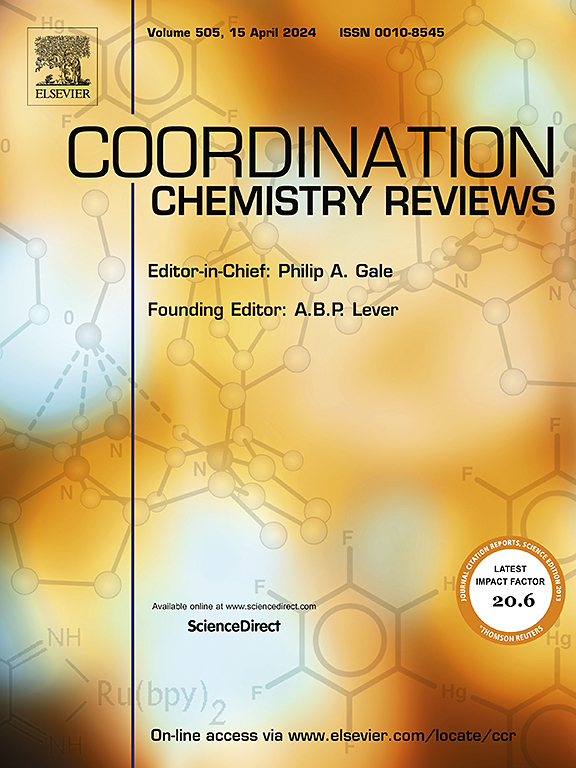From material-derived to artificial intelligence-empowered intelligent hydrogels
IF 23.5
1区 化学
Q1 CHEMISTRY, INORGANIC & NUCLEAR
引用次数: 0
Abstract
Material-derived intelligent hydrogels have demonstrated remarkable application potential in biomedicine, flexible electronics, food, and other fields due to their dynamic response capabilities to external environmental factors. In recent years, machine learning (ML)-empowered intelligent hydrogels have promoted the transformation of material-derived intelligent hydrogels into intelligent systems with “intelligent design-perception-decision” functions. However, previous studies have focused on the intelligent response mechanisms and regulatory optimization of material-derived hydrogels, lacking a systematic review of ML-empowered intelligent hydrogel systems. This review combines material-derived intelligent hydrogels with ML systematically reviews their regulation strategies ML-empowered mechanisms and practical applications and points out the main challenges and future research directions. Starting from the material derivation mechanism, it elucidates how the mechanism supports basic intelligent responses. Then, macroscopic regulation methods for shape changes are discussed, including swelling/shrinking, bending, rigidity, and self-healing capabilities. Additionally, advanced ML-empowered intelligent hydrogel systems are highlighted, discussing ML in intelligent hydrogel systems, data-driven material design, and intelligent analysis of multi-dimensional response behaviors. Finally, this paper summarizes the innovative applications of ML-empowered intelligent systems in multiple fields and proposes the challenges and prospects they face.从材料衍生到人工智能智能水凝胶
材料衍生的智能水凝胶由于具有对外部环境因素的动态响应能力,在生物医药、柔性电子、食品等领域显示出显著的应用潜力。近年来,基于机器学习(ML)的智能水凝胶推动了材料衍生的智能水凝胶向具有“智能设计-感知-决策”功能的智能系统的转变。然而,之前的研究主要集中在材料源性水凝胶的智能响应机制和调控优化上,缺乏对机器学习智能水凝胶系统的系统综述。本文将材料衍生的智能水凝胶与机器学习相结合,系统地综述了它们的调控策略、机器学习机制和实际应用,并指出了主要挑战和未来的研究方向。从物质衍生机制出发,阐述了该机制如何支持基本的智能响应。然后,讨论了形状变化的宏观调控方法,包括膨胀/收缩、弯曲、刚度和自愈能力。此外,还重点介绍了先进的基于ML的智能水凝胶系统,讨论了智能水凝胶系统中的ML,数据驱动的材料设计以及多维响应行为的智能分析。最后,本文总结了基于机器学习的智能系统在多个领域的创新应用,并提出了它们面临的挑战和前景。
本文章由计算机程序翻译,如有差异,请以英文原文为准。
求助全文
约1分钟内获得全文
求助全文
来源期刊

Coordination Chemistry Reviews
化学-无机化学与核化学
CiteScore
34.30
自引率
5.30%
发文量
457
审稿时长
54 days
期刊介绍:
Coordination Chemistry Reviews offers rapid publication of review articles on current and significant topics in coordination chemistry, encompassing organometallic, supramolecular, theoretical, and bioinorganic chemistry. It also covers catalysis, materials chemistry, and metal-organic frameworks from a coordination chemistry perspective. Reviews summarize recent developments or discuss specific techniques, welcoming contributions from both established and emerging researchers.
The journal releases special issues on timely subjects, including those featuring contributions from specific regions or conferences. Occasional full-length book articles are also featured. Additionally, special volumes cover annual reviews of main group chemistry, transition metal group chemistry, and organometallic chemistry. These comprehensive reviews are vital resources for those engaged in coordination chemistry, further establishing Coordination Chemistry Reviews as a hub for insightful surveys in inorganic and physical inorganic chemistry.
 求助内容:
求助内容: 应助结果提醒方式:
应助结果提醒方式:


